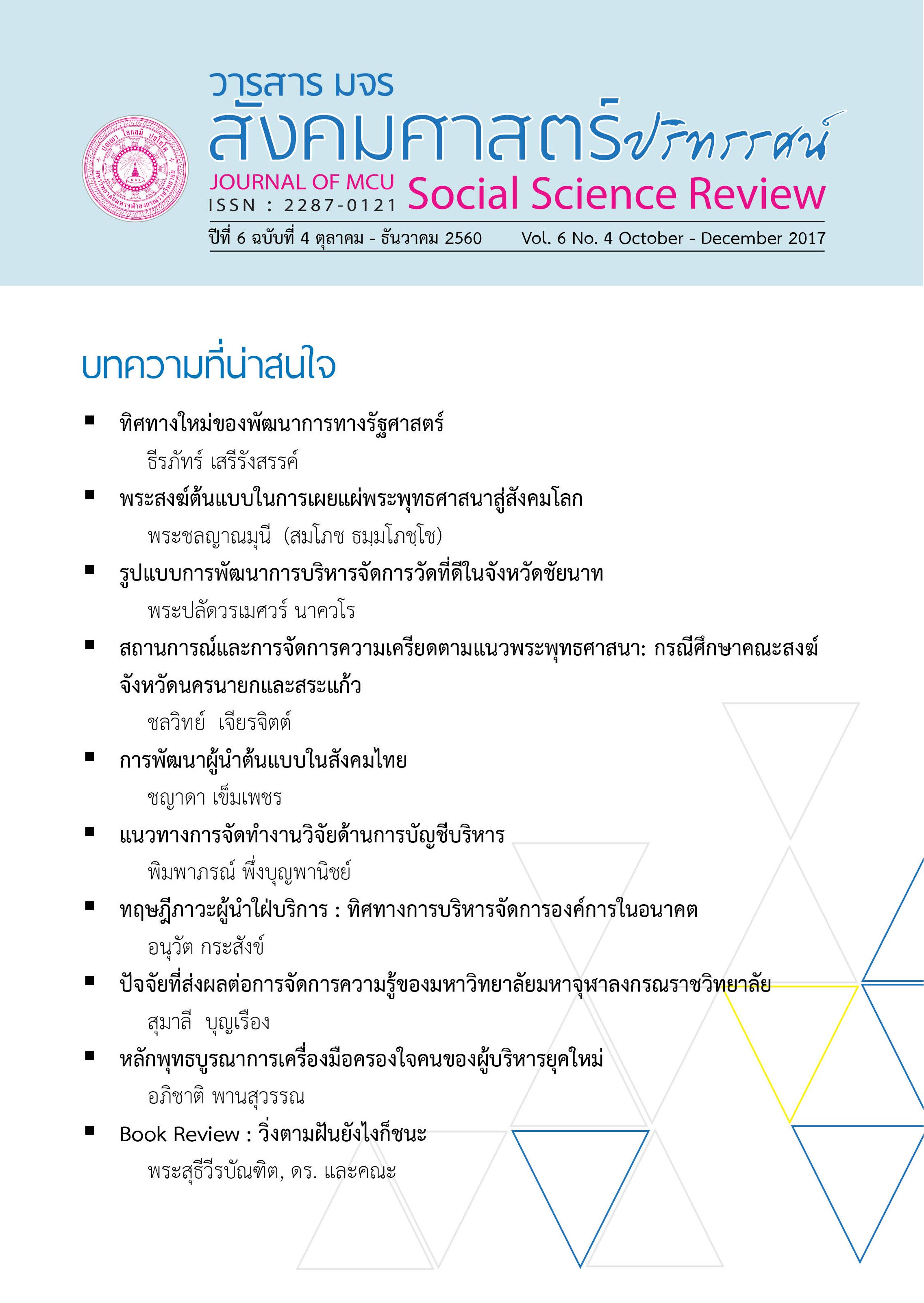แนวทางการแก้ไขปัญหาประมงไทยโดยใช้ความรับผิดชอบต่อสังคม ขององค์กรมาตรฐานสากล
คำสำคัญ:
ประมงไทย, ความรับผิดชอบต่อสังคมมาตรฐานสากลบทคัดย่อ
บทความนี้มีวัตถุประสงค์เพื่อศึกษา 1. สาเหตุที่ธุรกิจประมงไทยได้รับใบเหลืองจากคณะกรรมาธิการสหภาพยุโรป 2. ผลกระทบที่ธุรกิจประมงไทยได้รับใบเหลืองจากคณะกรรมาธิการสหภาพยุโรป 3. แนวทางการปฏิบัติความรับผิดชอบต่อสังคมมาตรฐานสากลที่สำคัญในการแก้ปัญหาธุรกิจประมงไทย โดยผู้วิจัยใช้การสัมภาษณ์เชิงลึก ด้วยแบบสัมภาษณ์กึ่งโครงสร้างกับผู้ให้ข้อมูลสำคัญ ที่เลือกแบบเจาะจง 5 กลุ่ม คือ 1) องค์กรธุรกิจเรือประมงไทย จำนวน 15 คน 2) องค์กรธุรกิจส่งออกอาหารทะเล 13 คน 3) นักวิชาการและผู้เชี่ยวชาญด้านความรับผิดชอบต่อสังคมขององค์กร จำนวน 6 คน 4) ภาครัฐ จำนวน 6 คน 5) องค์กรไม่แสวงกำไรที่เกี่ยวข้องกับความรับผิดชอบต่อสังคมขององค์กร จำนวน 4 คน รวมผู้ให้ข้อมูลสำคัญทั้งหมด 44 คน ผลการวิจัย พบว่า 1.สาเหตุที่ธุรกิจประมงไทยได้รับใบเหลืองจากคณะกรรมาธิการสหภาพยุโรป คือ การขาดจริยธรรมจรรรยาบรรณทางธุรกิจและการขาดความรับผิดชอบต่อสังคมของทุกฝ่ายที่เกี่ยวข้อง ทั้งองค์กรธุรกิจเรือประมง องค์กรธุรกิจส่งออกอาหารทะเล รวมทั้งภาครัฐ ที่ขาดการบังคับใช้กฎหมายอย่างจริงจัง 2.ผลกระทบที่ธุรกิจประมงไทยได้รับใบเหลืองจากคณะกรรมาธิการสหภาพยุโรป มีทั้งด้านบวกและด้านลบ โดยด้านบวก คือ ทุกฝ่ายที่เกี่ยวข้องกับธุรกิจประมงไทย ทั้งองค์กรธุรกิจเรือประมง องค์กรธุรกิจส่งออกอาหารทะเล ต้องหันมาปรับปรุงเปลี่ยนแปลงวิธีการทำงาน ตั้งแต่ต้นน้ำ กลางน้ำ จนถึงปลายน้ำ ให้มีความถูกต้องและเหมาะสม ทั้งในด้านกฎหมาย ด้านจริยธรรมทางธุรกิจ และด้านความรับผิดชอบต่อสังคม ส่วนภาครัฐต้องบังคับใช้กฎหมายอย่างจริงจังโดยไม่มีข้อยกเว้น ส่วนผลในด้านลบ ที่เห็นได้ชัดในขณะนี้ คือ มูลค่าการส่งออกสินค้าประมงไทยลดลงเป็นอย่างมาก และหากไทยไม่สามารถแก้ไขปัญหาต่างๆได้จนเป็นที่พอใจของสหภาพยุโรป ก็จะทำให้ธุรกิจประมงไทยถูกคว่ำบาตรทางการค้าจากสหภาพยุโรปในอนาคต 3.แนวทางการปฏิบัติความรับผิดชอบต่อสังคมมาตรฐานสากลที่สำคัญในการแก้ปัญหาธุรกิจประมงไทย มี 5 ประเด็น คือ การอนุรักษ์และรักษาสิ่งแวดล้อม การเคารพสิทธิมนุษยชน การปฏิบัติต่อแรงงานอย่างยุติธรรม การคุ้มครองผู้บริโภค การต่อต้านการทุจริต
เอกสารอ้างอิง
Ajaree Tavornmas. Fisheries Illegal: Impact and Exit for Thailand? [Online]. Retrieved from http://www.bangkokbiznews.com/blog/detail/634527 [15 September 2016].
Chuenkamol Sinbangwa and Titaporn Sincharoonsak. (2017). The Impact of Social Accounting and Corporate Social Responsibility on The Sustainability of Listed Companies in the Stock Exchange of Thailand. Journal of MCU Social Science Review, 6(1), 161-168.
Crane, A. and Visser, W. (2008). The Oxford Handbook of Corporate Social Responsibility. New York: Oxford University Press.Books.
Department of Fisheries. (2012). Master Plan for Thai Marine Fisheries Management. Bangkok: Department of Fisheries.
Department of Strategic and Security. (2558). Studies Strategic and Strategic Situation Analysis. Bangkok.
Division of Agricultural Policy and Planning. (2016). Agricultural Economics, 1st Quarter 2559. Bangkok: Office of Agricultural Economics.
Foreign Agricultural Advisory Office European Union. Trade Statistics between the European Union and Thailand Between 2013 and 2015. [Online]. Retrieved from http://www2.thaieurope.net [1 November 2016].
Maleerat Phattatangsakun and Kanoksak Sukwatanasinit. (2017). Factors Affecting Effectiveness of Internal Audit of Public Autonomous Universities. Journal of MCU Social Science Review, 6(1), 103-114.
ดาวน์โหลด
รูปแบบการอ้างอิง
ฉบับ
ประเภทบทความ
สัญญาอนุญาต
ลิขสิทธิ์ (c) 2017 วารสาร มจร สังคมศาสตร์ปริทรรศน์

อนุญาตภายใต้เงื่อนไข Creative Commons Attribution-NonCommercial-NoDerivatives 4.0 International License.
เพื่อให้เป็นไปตามกฎหมายลิขสิทธิ์ ผู้นิพนธ์ทุกท่านต้องลงลายมือชื่อในแบบฟอร์มใบมอบลิขสิทธิ์บทความให้แก่วารสารฯ พร้อมกับบทความต้นฉบับที่ได้แก้ไขครั้งสุดท้าย นอกจากนี้ ผู้นิพนธ์ทุกท่านต้องยืนยันว่าบทความต้นฉบับที่ส่งมาตีพิมพ์นั้น ได้ส่งมาตีพิมพ์เฉพาะในวารสาร มจร สังคมศาสตร์ปริทรรศน์ เพียงแห่งเดียวเท่านั้น หากมีการใช้ภาพหรือตารางหรือเนื้อหาอื่นๆ ของผู้นิพนธ์อื่นที่ปรากฏในสิ่งตีพิมพ์อื่นมาแล้ว ผู้นิพนธ์ต้องขออนุญาตเจ้าของลิขสิทธิ์ก่อน พร้อมทั้งแสดงหนังสือที่ได้รับการยินยอมต่อบรรณาธิการ ก่อนที่บทความจะได้รับการตีพิมพ์ หากไม่เป็นไปตามข้อกำหนดเบื้องต้น ทางวารสารจะถอดบทความของท่านออกโดยไม่มีข้อยกเว้นใดๆ ทั้งสิ้น





